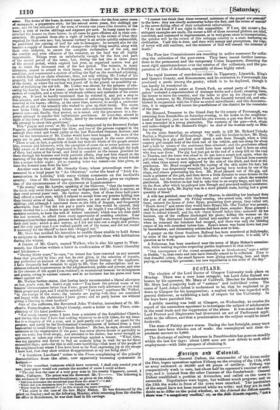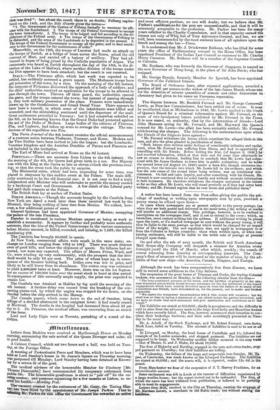_foreign anti erolonial. SwiTznaLatnx—General Dufour, the commander of the forces
under the Diet, began operations against Friburg on the evening of the 11th, with an army estimated at 30,000 and 86 pieces of artillery. Friburg was comparatively weak in men, had about half its opponent's number of artil- lery, and is isolated from the other Cantons of the Sonderbund. General Dufour established a position at Avrenches, and called on the town to surrender. Negotiations were begun, but without much progress; and on the. 13th the works in front of the town were attacked. The particulars of the sequel have not been received while we write; and they are in such doubt as to differ on the point whether, as the Journal des Debuts asserts, there was " a sanguinary conflict," or, as the Jae Gazette reports, " not a
shot was fired ": but about the result there is no doubt; Friburg capitu- lated on the 14th, and the Rile Gazette gives the terms-
1. The Government of the Canton of Fribnrg formally to renounce its alli- ance with the Sonderbund. 2. The troops of the Federal Government to occupy the town immediately. 3. The troops to be lodged and fed according to the re- gulations of the Federal army. 4. The troops of the Government of Friburg to be disbanded, and the arms of the Laudsturm to be deposited in the arsenal. 5. The troops of the Federal Government to occupy all the gates, and to lend assist- ance to the Government for the maintenance of order."
Meanwhile, on the 12th, the troops of Lucerne had made an attack on the troops of Zurich, at a bridge of boats across the Reuss, seized the old convent of Mari, and carried off a battery of artillery. They had ad- vanced in hopes of being joined by the Catholic population of Argau. The cannonade was heard at Zurich throughout the day of the 13th, in the di- rection of the Lake of Hallwyl, where another division of the troops under the Diet appears to have been attacked; but the result is not reported.
Imr.—The Fivizzano affair, which last week was reported to be settled, has suddenly assumed a grave aspect. The Modenese troops have got possession of the town, by a ruse. On the morning of the 5th instant, the outposts of Fivizzano discovered the approach of a body of soldiers; and the chief authorities received an application for the troops to be allowed to pass through the town. Thrown off their guard, the authorities opened the gates, and the troops entered the town; but instead of passing through it, they took military possession of the place. Protests were immediately drawn up by the Gonfaloniere and Grand Ducal Vicar. There appears to have been a tumult, in which some of the inhabitants were killed and wounded; and the skirmishing continued until the departure of the mail. Great excitement prevailed in Tuscany: but it had somewhat subsided on the 9th, on its becoming known that the Grand Duke had protested against the act of the Duke of Modena. Large bodies of the citizens of Florence, Pisa, and Leghorn, had taken up arms to revenge the outrage. The ren- dezvous of the expedition was Pisa.
The Turin Journal of the 8th instant contains the official announcement of a customs union between Piedmont, Tuscany, and Rome. Modena and the Two Sicilies have been invited to join the league; but the Lombardo- Venetian kingdom and the Austrian Dutchies of Parma and Piacenza are not included in the invitation.
The Earl of Minto had arrived at Rome on the 3d instant.
Pourmse.—There are accounts from Lisboa to the 9th instant. On the morning of the 4th, the Queen had given birth to a son. Her Majesty was with the King at the Opera as late as eleven o'clock the previous even- ing; so that the event took the public by surprise. The Ministerial crisis, which had been impending for some time, was placed in abeyance by this sudden event at the Palace. The main diffi- culty continued to be the old financial one: it is not easy to find a truly independent able Minister who will undertake to provide the money needed by a bankrupt Court and Government. A few chiefs of the Liberal party had paid their respects at the Palace.
The British fleet lay at anchor off Packet Stairs.
NORTH AmErace--Though the accounts brought by the Cambria from New York are dated a week later than those received last week by the Missouri, they bring nothing of later date from Mexico. We collect, how- ever, a few additional points of news.
General Quitman had been appointed Governor of Mexico; occupying the palace of the late President.
Paredes is mentioned in various Mexican papers as being at work to estdblish a monarchy. It appears by further and probably more authentic accounts, that the loss of the United States troops in the various encounters before Mexico amount, in killed, wounded, and missing, to 1,623; the killed numbering 238.
The Cambria has brought 60,0001. in specie. At New York, commercial affairs were mneh in the same state; ex- change on London ranging from 1091 to 109/. There was much distrust even of good bills; and hence the shipment of specie. No failures had oc- curred, nor were any expected. The affairs of Messrs. Prime Ward, and Co , were winding up very unfavourably, with the prospect that the divi- dend-would be only 10 per cent. The price of wheat kept up, in conse- quence of the farmers' holding back. Indian corn was low in price, and likely to be still lower from its abundance. The cotton crop was estimated to yield 2,200,000 bales at least. Moreover, there was on the 1st Septem- ber an excess of 100,000 bales over the usual stock in hand at that period. In consequence of this unusually ample supply, the price was expected to remain low.
The Cambria was detained at Halifax by fog until the morning of the 4th instant. A further delay was caused from the breaking of the con- necting piston-rod, by which the engine was stopped for six hours, on the Sunday before the ship arrived in the Mersey. The Canada papers, which come down to the end of October, bring tidings of a decided abatement in the emigrant fever: it had nearly ceased at Montreal. The deaths in the hospital had decreased from about 25 per day to 5. Dr. Primrose, the medical officer, was recovering from an attack of the fever.
Lord and Lady Elgin were at Toronto, partaking of a round of fes- tivities.



























 Previous page
Previous page